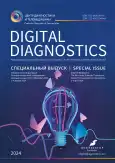Legal regulation of remote consultation in the field of telemedicine
- Authors: Kovalenko M.A.1
-
Affiliations:
- Volgograd State University
- Issue: Vol 5, No 1S (2024)
- Pages: 34-36
- Section: Articles by YOUNG SCIENTISTS
- URL: https://bakhtiniada.ru/DD/article/view/261091
- DOI: https://doi.org/10.17816/DD626878
- ID: 261091
Cite item
Full Text
Abstract
BACKGROUND: The use of telemedicine technologies in the provision of medical care is becoming a widespread phenomenon. The law is designed to regulate emerging social relations in order to prevent negative manifestations and organize their harmonious development. In the field of medicine, it is important to establish legal norms aimed at protecting and safeguarding the rights and legitimate interests of the patient, since fundamental natural human rights — the right to health care and life — are affected. The provision of a wide margin of discretion to those engaged in medical-legal relations may result in a significant violation of the constitutional right of a citizen to health. One of the principal applications of telemedicine technologies is remote consultation with the patient.
AIM: The aim of the study was to review the current legal framework regulating remote patient consultations, identify problematic issues, and propose solutions to address these issues.
MATERIALS AND METHODS: The materials of the present study are the Federal Law dated November 21, 2011 № 323-FZ “On the Fundamentals of Health Protection of Citizens in the Russian Federation”, Order of the Ministry of Health of the Russian Federation dated November 30, 2017 № 965n, Order of the Ministry of Health of the Russian Federation dated September 14, 2020 N 972n. The research methods are formal-legal, comparative-legal, as well as general scientific methods of cognition.
RESULTS: The general legal regulation permits remote consultation with the patient in the absence of a face-to-face preliminary visit to the attending physician (Art. 36.2 of the Federal Law dated November 21, 2011 No. 323-FZ “On the Fundamentals of Health Protection of Citizens in the Russian Federation”). Nevertheless, the physician is constrained in his authority to prescribe treatment, modify previously prescribed therapy, or issue an electronic prescription. The result of such a consultation is a medical report. Should the physician determine that a face-to-face appointment is necessary, the patient may be advised to undergo preliminary examinations (clauses 47 and 48 of the Procedure for the Organization and Provision of Medical Care with the Use of Telemedicine Technologies, approved by Order of the Ministry of Health of the Russian Federation No. 965n dated November 30, 2017). Consequently, there are issues pertaining to the determination of the potential content of the medical report (clause 9 of the aforementioned Order). This affects the scope of liability, as the consulting physician is liable within the limits of the issued medical opinion. Furthermore, these provisions conflict with the requirements to indicate in the medical report reasonable conclusions about the presence (absence) of diseases, the presence of medical indications or medical contraindications for the use of methods of medical examination and (or) treatment, to determine the effectiveness and validity of therapeutic and diagnostic measures (paragraphs “b” and “c” of the Procedure for Issuing Certificates and Medical Reports by Medical Organizations, approved by Order of the Ministry of Health of the Russian Federation No. 972n dated September 14, 2020).
CONCLUSIONS: The development of telemedicine necessitates the implementation of appropriate regulatory frameworks, as well as the resolution of existing gaps and conflicts. These include the absence of specific requirements pertaining to the content of a medical report issued within the context of remote consultation, as well as the definition of its legal significance. Concurrently, the Procedure for Issuing Certificates and Medical Opinions by Medical Organizations stipulates that a medical opinion may be provided upon the patient’s request. In contrast, the Procedure for Organizing and Providing Medical Care Using Telemedicine Technologies specifies that it is issued following a remote consultation. Furthermore, the correlation between a medical report and a consultation sheet remains undefined.
Full Text
##article.viewOnOriginalSite##About the authors
Maria A. Kovalenko
Volgograd State University
Author for correspondence.
Email: veruver@mail.ru
ORCID iD: 0000-0002-8412-7900
SPIN-code: 4965-4358
Russian Federation, Volgograd
References
- Federal Law of Russian Federation №323-F3 of 21 November 2011. “On the Fundamentals of Health Protection of Citizens of the Russian Federation”. Available from: http://www.rosminzdrav.ru/documents/7025-federalnyy-zakon-323-fz-ot-21-noyabrya-2011-g (In Russ).
- Order of the Ministry of Health of the Russian Federation of 30.11.2017 No. 965n “On approval of the order of organization and provision of medical care with the use of telemedicine technologies”. Available from: http://publication.pravo.gov.ru/document/0001201801100021 (In Russ).
- Order of the Ministry of Health of the Russian Federation No. 972n of 14.09.2020 “On Approval of the Procedure for issuing certificates and medical reports by medical organizations”. Available from: http://publication.pravo.gov.ru/Document/View/0001202012040021 (In Russ).
- Buyanova AV. Telemedicine - problems of regulation and law enforcement. Sotsial'no-politicheskie nauki. 2018;(2):235–238. EDN: XNYHVZ
- Voshev DV, Vosheva NA, Son IM, Drapkina OM. Factors influencing the digital transformation in primary health care (review article). Current problems of health care and medical statistics. 2023;(4):751–774. EDN: ABMOMT doi: 10.24412/2312-2935-2023-4-751-774
- Zingerman BV, ShklovskyKordi NE, Vorobiev AI About telemedicine “patient to doctor”. Medical doctor and IT. 2017;(1):61–79. EDN: XXJBTJ
- Gallese Nobile C. Legal Aspects of the Use Artificial Intelligence in Telemedicine. Journal of Digital Technologies and Law. 2023;1(2):314–336. EDN: VSKCFB doi: 10.21202/jdtl.2023.13
- Aksenova EI, Gorbatova SYu. Regulation of telemedicine services around the world: an expert review. Moscow: GBU «NIIOZMM DZM»; 2023. (In Russ). EDN: CHVKIY
Supplementary files









